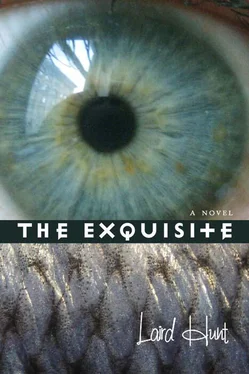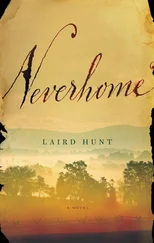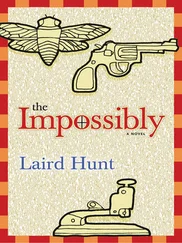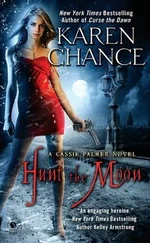Lots. Descartes was there, they say, as was, possibly, Sir Thomas Browne. Did you know that in those days we still believed that after death one could feel pain? I certainly could. Most excruciating were the extremities. The first thing he did was to open up my arm.
Or at least, Dr. Tulp said, in the painting the first thing that has been opened is the arm.
Yes, in the painting. Of course a real dissection, as my German writer points out, would begin with the intestines — those areas most given to decomposition. Regardless, there was vigorous applause. I understood the larger part of the audience had been expecting a lesson in female rather than male anatomy — it is female rather than male anatomy that excites in this context, but then what is the gender of the dead? During the lesson, I learned the verb extirpate . Do you know it?
Yes, Henry, I know it.
What I had tried to do was steal the man’s cape.
I think it is time to stop now with this, Henry — you said yourself the mask is off. We’ve done enough for now.
Dr. Tulp was there.
I am Dr. Tulp, Henry.
Dr. Nicolas Tulp of the Royal Dutch Academy, who regularly performed such dissections for the benefit of Amsterdam’s intelligentsia, so that light would replace shadow and their minds would be freed of mist. Little matter that in the center of this, so to speak, sweeping-away of the cobwebs lay a small, recently breathing body.
We have no indication, outside of Rembrandt’s painting, that Aris Kindt was a particularly small man.
I’m small.
No, Henry, you are not. You are quite average.
Well then never mind.
Where is Mr. Kindt right now, Henry?
Oh, he’s around.
But diminished.
Somewhat. Dr. Tulp?
Yes, Henry.
Should I expect you to begin diminishing, so you can take care of your own business, or will you stick around for the odd chat and to perform the occasional minor or major surgery? I guess what I am wondering is, why, Dr. Tulp, are you here? How did you get here?
Dr. Tulp smiled, a little coldly, and didn’t answer.
I looked around the brightly lit office, with its rows and rows of folders and dull, worn office furniture, and shuddered.
I’d like to go home, I said. To Carine and the cats.
This is where you live now, Henry.
Can it, fairly, be called living?
What would you like to call it?
Have you scheduled any more surgeries? Any more scouring and filing and cleaning?
A few. There is more scraping to be done. We must be sure that all the lead is gone.
Am I still going to be moving on?
Eventually, Henry, but not just yet. I feel you’ve made a breakthrough, and it must be encouraged. I have filed for a postponement.
A reprieve.
If you like.
Until they hook me up to a machine and put me behind bars, boil my head, tear me asunder, chop off my hands.
What you did was very serious, Henry. Murder is serious, there are consequences. These are the consequences.
What did you do, Dr. Tulp? Are these your consequences too? Do you have any visitors? Am I your visitor? Is that it? Am I going to get to perform some surgery on you?
She smiled.
You are making progress, Henry, she said. And, unfortunately for me, I suspect, it will all become more and more clear as you continue to reflect on it. Perhaps you should set the results of your reflections down on paper. I will make sure you get some. I have thought of doing the same thing myself. There is so much I’m unsure of. You will see. I think we all will. There is light pouring into the darkness, flooding the corridors. It is moving more quickly now.
We walked then, arm in arm around the East Village, and as we wove our way past bus stops and beat-up garbage cans and derelict water fountains and the constantly, abruptly changing vectors of people moving forward, Mr. Kindt leaned in close to me and talked. He started by explaining that “by chance” Cornelius had phoned him just after I had left and that they had conferred and agreed that I might as well know the story of their night together “all those years ago,” that knowing it might help set my mind at ease, might allay my fears of being tricked “and so forth,” while at the same time producing the “happy result” of admitting me into an even greater measure of complicity with “my friends.”
For we are your friends, Henry, Mr. Kindt said. Your dear friends, and none dearer, of course, than myself.
I said I felt the same way and wanted very much to know what had happened, but didn’t want to precipitate another screaming episode. Mr. Kindt waved his free hand in a dismissive way, said he felt much better now, that a little stroll in the neighborhood would set him to rights and that I shouldn’t worry about him at all.
All right, I said.
Good, he said.
Now I want you to picture, Henry, a town of fine homes and half-lit streets undulating on the banks of a shining lake and in this town two ambitious young men, who have met, shall we say, a third young man, and formed a happy triangle. This third point in the triangle is passing through town, making his circuitous way to New York from the Netherlands, with a valise containing an impressive number of valuable bonds. Can you picture it? Can you smell the late summer air, still warm, though shot through with the hint of autumn coming on? Can you admire the juxtaposition of three young men up to nothing terribly good in that lovely, quiet town next to those lovely, quiet waters? Now, never mind, dear boy, how we met this young man with his valise — let’s just say that Cornelius had his ear to the proverbial ground and that both of us were already involved in certain aspects of the trade that made us, on the face of it, unthreatening to others in our line. Suffice it to say that we approached this young man and offered him a number of drinks, first in his hotel room and then in an establishment we knew and then down on the banks of Lake Otsego. We entered into a kind of confidence as we drank, and it was on those banks that this young man pulled a rumpled reproduction from his pocket, unfolded it, pointed to the corpse lying at its center, and told us it was his favorite painting. He loved it so much that he had borrowed the name of the painting’s “hero,” the corpse he was pointing to, for the purposes of the bit of business he was attending to. He spoke at some length, not quite but almost slurring his words, about how strangely thrilling it was to be using a new name, one that had belonged to the dead individual who lay at the center of Rembrandt’s famous painting. He had had false documents made and was now, for the duration of his journey to New York City and perhaps, who knew, he said, beyond, called Aris Kindt.
Ah, I said.
And you see I looked very much like him and still had that touch of a Dutch accent.
Your namesake.
Mr. Kindt nodded. Yes, and carrying around a reproduction of a likeness of his namesake. He looked upon this tattered image of a man whose face is cast in shadow and who has been torn open in the name of progress with great fondness, almost tenderness. In speaking of this dead man, who had been so profoundly violated, he evoked Goethe’s notion of elective affinities and marveled that of all the people in the wide world he might have felt drawn to it was this Aris Kindt, this dead, dissected man. It’s a nice name, isn’t it? he asked us. And I thought to myself, yes, it certainly is.
You killed him.
In a manner of speaking. He was a swimmer, you see. He got it into his head — well, we helped with this — that he wanted to show us just what a very fine swimmer he was. So we all went out onto the lake. Cornelius and I in a sort of canoe. He made it surprisingly far. In fact he very nearly reached the opposite shore. Then I became Aris Kindt.
Читать дальше










![Беар Гриллс - The Hunt [=The Devil's Sanctuary]](/books/428447/bear-grills-the-hunt-the-devil-s-sanctuary-thumb.webp)

